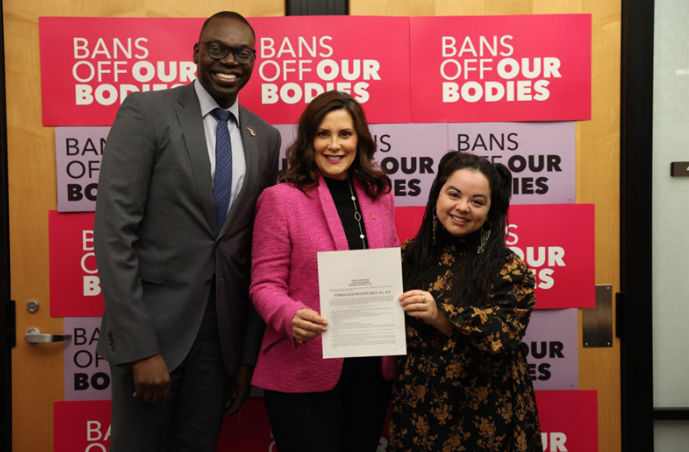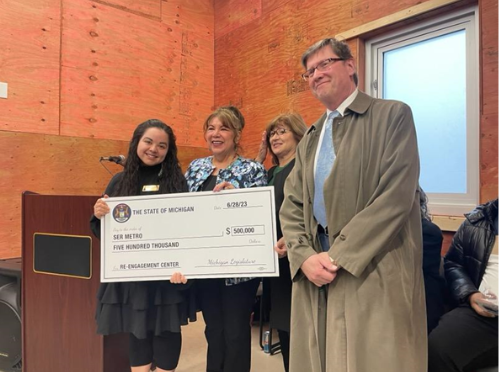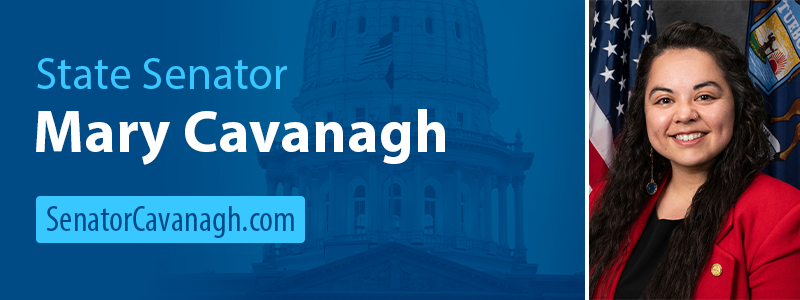Dear Neighbor,
November and December round out our busy year in Senate District 6! We have been all around the district listening to your concerns and meeting with community members to better serve you. As we continue the holiday season and prepare for winter, I hope you are taking time to rest and gather with loved ones. The end of the year is a perfect opportunity to express gratitude in our lives — and I am incredibly grateful to serve and represent you in District 6.
This year, the Senate #MajorityForThePeople has passed critical legislation to address the issues and challenges facing our state by listening to and engaging in real conversations with our constituents. I look forward to our continued progress in the new year!
As always, please feel free to reach out to my office if I may ever be of assistance to you. You can email us at senmcavanagh@senate.michigan.gov or call 517-373-7748.
Featured in this newsletter:
- Legislative Updates
- District Updates
- Other Important Updates

Mary CavanaghState SenatorDistrict 6
Legislative Updates

Nearly 2.5 million Michigan voters showed overwhelming support for Proposal 3 in November 2022 after the U.S. Supreme Court overturned Roe v. Wade.
On November 22, Michigan took another bold step forward to ensure Michigan laws reflect Michigan values when Gov. Whitmer signed the Reproductive Health Act (Senate Bills 474–477 and 593) into law.
The Reproductive Health Act does the following:
- Protects and expands access to reproductive healthcare for Michiganders statewide;
- Aligns Michigan’s laws with the new reproductive health protections in Michigan’s constitution;
- Repeals the 1931 abortion ban, as passed by Senate Democrats earlier this year; and
- Repeals medically unnecessary regulations and removes reporting requirements and administrative burdens that are not placed on any other healthcare providers.
This legislation was crafted with constituents and advocates in mind, taking into account their diverse lived experiences and perspectives. I am incredibly proud to have sponsored Senate Bill 477 in the Reproductive Health Act and ensure bodily autonomy for Michigan residents is reflected in Michigan law.
Juvenile Justice Reform
Senate Bills 418, 421, 425, 426, 428, 429 and 435 (sponsored by Sens. Santana, Klinefelt, Shink, Wojno, Chang, Irwin and Polehanki) were signed into law this month by Lt. Gov. Gilchrist. This legislative package makes much needed improvements to Michigan’s juvenile justice system and fulfills many of the recommendations made by the Michigan Task Force on Juvenile Justice Reform.
The expansion of the Michigan Indigent Defense Commission reflects a commitment to providing comprehensive defense standards for youth. Prioritizing rehabilitation and addressing outcome disparities not only leads to positive outcomes for the youth in Michigan’s justice system but also contributes to safer communities across our state.
Drug Immunity Repealed in Michigan
This month, Gov. Gretchen Whitmer signed SB 410 repealing drug immunity in the state of Michigan into law. Sponsored by Sen. Jeff Irwin, the new law eliminates legal provisions that shielded pharmaceutical companies from certain lawsuits brought by consumers.
In 1995, Michigan passed legislation that made the state the only one in the nation that protected drug manufacturers and sellers from liability stemming from the safety and efficacy of their products. The 1995 legislation left the state of Michigan and its residents unable to address the conduct of companies in the context of the opioid epidemic and recovery of taxpayer dollars paid out from the Medicaid program due to fraud.
With this legislation now repealed, Michigan and our residents are on an even playing field with the rest of the country in terms of drug industry liability.
Death with Dignity
I have introduced the Death with Dignity Act alongside my colleagues Senators Hertel, Singh and Klinefelt. Senate Bills 678–681 would allow terminally ill patients the option to request and use prescribed medication to end their lives peacefully on their own timeline.
If passed, Michigan would join 10 states and Washington, D.C. that have expanded patients’ power to make decisions regarding their end-of-life care. Since Oregon became the first to allow this practice in 1997, the state has demonstrated the law is safe, effective and meaningful in providing terminally ill residents the fundamental freedom they deserve.
Embedded in the package are numerous regulations, safeguards, and considerations that ensure the safe practice of the policy, including determining that the patient is terminally ill with fewer than six months to live; ensuring the patient is able to make the voluntary decision of medical aid in dying; a minimum 15-day waiting period; access to insurance coverage in treatment and benefits in death; licensing requirements, limitations, and protections for prescribing physicians; and criminal penalties for non-compliant physicians.
Clean Energy Future Plan Signed into Law
In response to the escalating impact of climate change, and the rising frequency of severe weather events and extreme temperatures in Michigan, our #MajorityForThePeople introduced the Clean Energy Future plan (Senate Bills 271, 273, 277, 502 and 519), which Go
v. Gretchen Whitmer signed into law last month.

This legislation establishes long-awaited clean energy and renewable energy standards, elevates energy efficiency targets, establishes a new Community and Worker Economic Transition Office and broadens the responsibilities of the Michigan Public Service Commission (MPSC).
These bills make significant and historic progress toward a sustainable future for Michigan and lay a solid foundation for continued work to improve Michigan’s energy industry and protect our air, land and water.
Financial Disclosure, Improving Transparency
For many years, Michigan was one of only two states where lawmakers did not have to file any type of public report about their personal finances. After extensive input from stakeholders and lawmakers, bipartisan financial disclosure legislation (Senate Bills 613–616, sponsored by Sen. Jeremy Moss and Sen. Sam Singh) has been passed by the Legislature and signed into law by Governor Whitmer. This legislation codifies Proposal 1 of 2022, which was supported by 2.8 million Michigan voters in 2022.
The legislation passed would ensure that starting next year on April 15, each lawmaker must disclose:
- Every source of income;
- Assets held for investment or production of income;
- Significant liabilities;
- Positions held in organizations;
- Future employment agreements;
- Spouse’s occupation and more.
The Senate bills also extend this disclosure to candidates for office so that voters can vet these potential conflicts as they decide on who they want to represent them.
Michigan Department of Lifelong Education, Advancement and Potential Officially Launches
On December 1, Governor Gretchen Whitmer officially launched the Michigan Department of Lifelong Education, Advancement and Potential, or MiLEAP. The new department, established by executive order in July, is tasked with improving outcomes from preschool through postsecondary so anyone can ‘make it in Michigan’ with a solid education and a path to a good-paying job.
I am excited to work with Acting Director Michelle Richards and her team as we craft the Fiscal Year 2025 budget and I anticipate all the great projects, programs, and work that will come out of the department.
The new department will take over several early learning, higher education and education partnership responsibilities from other state departments. Over 300 staff members will join MiLEAP in the same roles they had in their previous department. For more information, click here.
District Updates
We participated in numerous community events in both November and December, including attending the Redford Veterans Day Ceremony, Sri Baktha Hanuman of Farmington Hills’ Diwali Celebration, and Livonia’s Christmas tree lighting; volunteering with the Grandmont Community Association’s Hat & Glove Drive and local turkey giveaways; honoring constituents at the Governor’s Service Awards Ceremony, and Commissioner McCormick’s Holiday Reception; providing legislative updates at community clubs and neighborhood organizations, and more!

I presented a check to SER Metro for the funding they received in the Fiscal Year 2024 budget for their Youth Reengagement Center. As Chair of the LEO/MEDC Appropriations Subcommittee, I advocated for this funding and am proud to support the great work SER Metro is doing, including investing this funding right back into our community.
Other Important Updates
FAFSA Applications
High school seniors: the Free Application for Federal Student Aid (FAFSA) for the 2024-2025 school year will open by December 31. The application is free to complete. To learn more about the FAFSA, please visit usa.gov/FAFSA
Health Insurance Open Enrollment
Open enrollment for 2024 health insurance runs through January 15 on HealthCare.gov. DIFS will host an online town hall at 12:00 p.m. on Monday, January 8; find further details at Michigan.gov/HealthInsurance. The DIFS call center is also available to answer your questions, at 877-999-6442 or online at Michigan.gov/HealthInsurance.
Wayne County Needs Meals on Wheels Volunteers

Wayne County is in need of volunteers to package and deliver meals to seniors in our community through the Meals on Wheels program. For more information on volunteering, call 734-326-5202 or visit WayneCounty.com/SVS
New State Program Backing Pro-Housing Policy Changes by Local Governments
The Michigan State Housing Development Authority (MSHDA) has announced the new Housing Readiness Incentive Grant Program, with $5 million in funds to support cities, villages, and townships in adopting or eliminating rules and regulations to encourage building more housing and making housing more affordable.
Cities, villages and townships that apply for the program may receive a maximum grant of $50,000 to cover costs associated with adopting land use policies, master plan updates, zoning text amendments and similar activities that increase housing supply and affordability. The work may be performed by existing and/or contracted employees and/or third-party consultants.
Corporation’s Redevelopment Ready Communities (RRC) program — an initiative for communities to develop best practices in planning, zoning and economic development with the goal of supporting community driven development.
Funds will be made available to cities, villages and townships depending on whether they have an Engaged, Essentials or Certified designation from the Michigan Economic Development Corporation’s Redevelopment Ready Communities (RRC) program — an initiative for communities to develop best practices in planning, zoning and economic development with the goal of supporting community driven development.
Municipalities will be placed into one of two categories based on RRC designation status. Of the total $5 million allocated to the program, $3 million will be set aside for applicants that do not have an RRC designation. The remaining $2 million will be available to applicants that have a designation.
The online application portal will open Tuesday, Jan. 16, and will remain open until funding has been exhausted. Applications will be reviewed by MSHDA and awarded as they are received.
For details and access to the application portal when live, visit the Housing Readiness Incentive Grant Program (michigan.gov) page on MSHDA’s website.
EGLE Offers Technical, Managerial, and Financial Support for Lead Service Line Replacements
The Department of Environment, Great Lakes, and Energy is offering a grant for the funding of confirming locations of lead service lines for submittal of Complete Distribution System Materials Inventory and assist communities in utilizing the Bipartisan Infrastructure Law (BIL) DWSRF dollars for lead line replacement, which are available through Fiscal Year 2027.
Eligible activities include physical verification of service lines at properties where lead is suspected but not confirmed or where service line material is unknown but likely contains lead. Associated project planning document development related to lead line replacements, and outreach/education in support of lead service line replacement activities that result from the verifications done as part of this grant are also eligible.
All publicly owned community drinking water systems are eligible for this funding, with priority given to applicants that have not previously received funding for these activities and have low Median Annual Household Income (MAHI) per the federal census.
Proposals are being accepted January 1-31 For additional information on the grant you can find more information here. Any questions can be sent to EGLE-DWGrants@michigan.gov.

